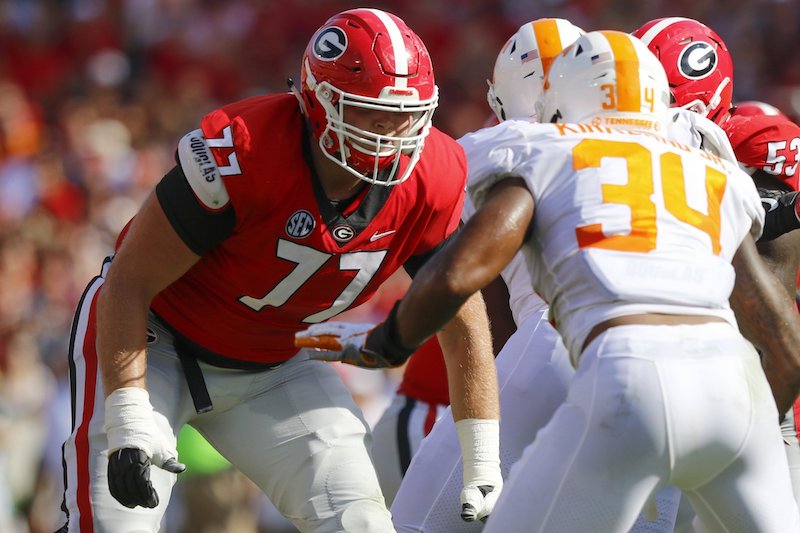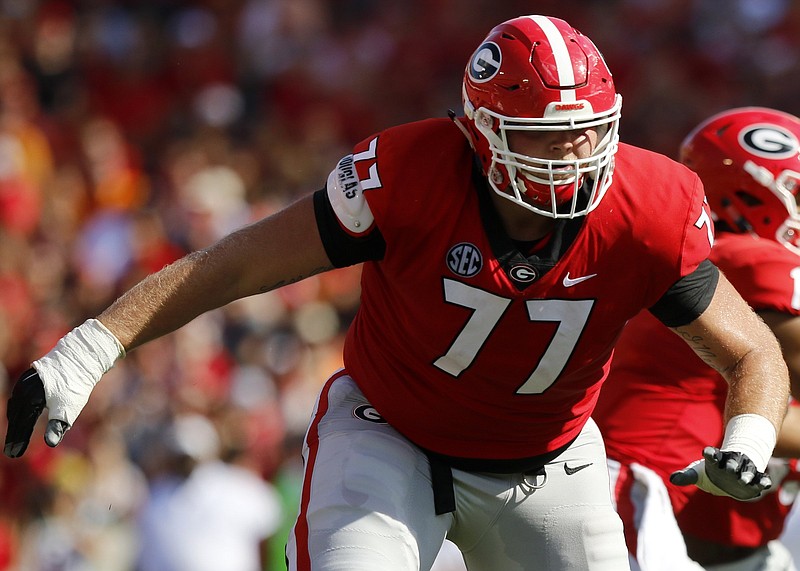 Staff photo by C.B. Schmelter / Georgia offensive lineman Cade Mays (77) looks for his block against Tennessee linebacker Darrin Kirkland Jr. during an SEC East matchup on Sept. 29, 2018, at Sanford Stadium in Athens, Ga. Mays transferred to Tennessee in the offseason but has not been granted a waiver making him eligible to play for the Vols this season.
Staff photo by C.B. Schmelter / Georgia offensive lineman Cade Mays (77) looks for his block against Tennessee linebacker Darrin Kirkland Jr. during an SEC East matchup on Sept. 29, 2018, at Sanford Stadium in Athens, Ga. Mays transferred to Tennessee in the offseason but has not been granted a waiver making him eligible to play for the Vols this season.Why isn't Cade Mays eligible?
Yes, in ordinary times this would be a difficult decision for the NCAA. Granting a waiver of immediate eligibility to a player who started and starred on Georgia's offensive line last season, as Mays did, but now wishes to return to his hometown of Knoxville to play for the Tennessee Volunteers this season has its obvious red flags.
After all, Mays is not only transferring within the Southeastern Conference, but also within the same SEC East Division, where his transfer will theoretically not only strengthen UT but weaken UGA.
If you were Georgia, would you want to blindly approve such a move without the normal penalty of Mays sitting out for a season?
No, you wouldn't. Especially after his father, Kevin, a former Big Orange star lineman in the Peyton Manning days, sued Georgia last December after he lost a finger in a folding chair accident on the UGA campus in 2017 during Cade's recruiting visit.
Because of that alone, there's almost certainly some bad blood and hurt feelings on both sides of this ongoing story, and Mays being granted immediate eligibility would do nothing to soothe the feelings of abandonment in the Bulldogs' camp.
But these are also far from ordinary times. We're in the middle of a coronavirus pandemic that understandably tugs at family desires to be closer together.
Cade's little brother, Cooper, will be a Vol this year. Mom and Dad, should the pandemic allow, are certain to be at every UT home game. The NCAA has often granted immediate eligibility the past few months to athletes arguing that the pandemic has caused them to want to transfer to a school closer to home.
For proof, former Kentucky basketball player Johnny Juzang, a native of Los Angeles, was granted an immediate waiver to play for UCLA this coming season. The ruling took less than two months from the time that Juzang announced he was leaving Big Blue to play closer to home.
Mays can't get closer to home than Knoxville, and he's been trying to get this waiver since weeks before the coronavirus arrived.
And maybe that's the problem. He can claim he wasn't happy in Athens. He can claim, as his attorney, Gegory P. Issacs, now is, according to the Knoxville News-Sentinel, that "Because of a variety of factors, it was a toxic environment that did not support Cade Mays' well-being as a student-athlete."
Or as ESPN basketball analyst and practicing attorney Jay Bilas tweeted: "Good grief. With all we're going through, Cade Mays has his transfer waiver denied? The NCAA has a chance to right this wrong on appeal, and should."
But for all the seemingly simple logic in that, Mays can't claim he just felt the need to come home because of COVID-19, which might have given him all the reason needed.
Instead, as his teammates push the hashtag #FreeCadeMays, the current predicament he finds himself is likely due to one of three scenarios regardling why the NCAA has denied Mays immediate eligibility, pending appeal.
First, could Georgia be holding up the process? Second, has Tennessee mishandled the transfer waiver? Last, is this merely another case of the NCAA's nonsensical, uneven, byzantine governing model, which the U.S. government should probably shut down if it ever gets past far more urgent issues such as the national debt, the coronavirus pandemic, unemployment, Antifa and systemic racism.
Let's start with the notion that Georgia might be involved, which third-year Vols coach Jeremy Pruitt seemed to hint at during a Monday evening Zoom call.
Without mentioning Bulldogs boss Kirby Smart, Pruitt said, "I know for everybody that has transferred from our place, I have written a letter for recommendation to the NCAA that requested they be approved for immediate eligibility."
He also said, again without specifically referencing Georgia: "I'm for the one-time transfer rule. My question is, 'Why should we stand in the way of a young man or woman trying to figure out what the right place for them is?' Right now that's not the rule. I hope that eventually that will be the rule."
Make of that what you will, but it sounds as if Pruitt is pointing the finger at Smart.
And if Georgia is holding up the transfer, Smart and the rest of the UGA brass might want to consider how all this might look to future recruits and their families. In today's uncertain environment on so many fronts, do you really want to play for a coach that might not honor your wish to go elsewhere if unhappy? Not saying I agree with that. Tough love can be the best love over time. Just saying today's parents and players don't often view it that way.
As for Tennessee, or the Mays family's handling of the case thus far, a different attorney is handling the appeal of the initial denial of the player's request for a waiver. Hmmmmm.
Then there's the NCAA itself. Wrote Mays' first attorney in this process, Tom Mars, upon the NCAA's ruling: "Why wouldn't the NCAA staff err on the side of granting (immediate eligibility) waivers, instead of kicking kids while they're down?"
Why, indeed? Oh, wait. It's the NCAA. Enough said.
Contact Mark Wiedmer at mwiedmer@timesfreepress.com. Follow him on Twitter @TFPWeeds.

